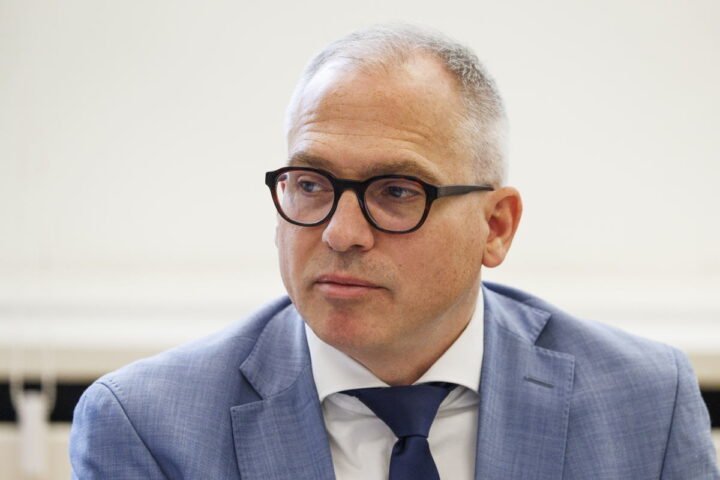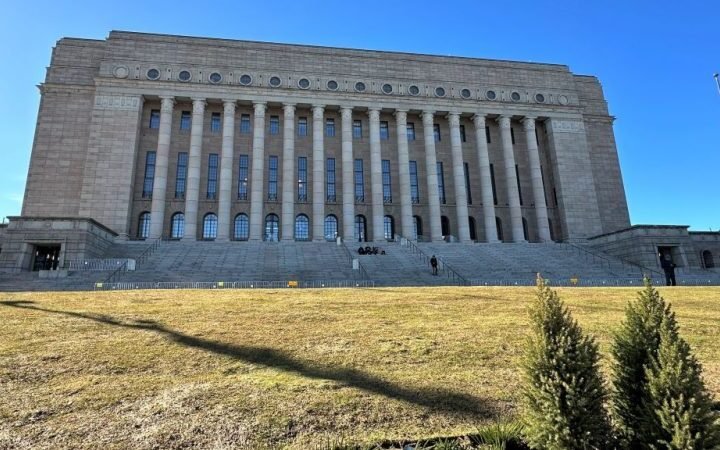A lively rave in the European Parliament highlights the unconventional approach of MEP Lukas Sieper, who has surprisingly excelled despite not aligning with any established political group. Recently, Sieper hosted an unofficial club night in his office, complete with a DJ and makeshift bar, amid warnings from party organizers to adhere to parliamentary decorum.
At only 28 years old, Sieper represents the tiny Party of Progress, which he founded during his student years, and was elected by 228,000 voters while running a campaign that cost just €2,500. He asserts that his approach aims to find avenues of influence without needing to be part of larger factions.
Only a year into his tenure, Sieper stands out as one of the most unconventional members of the European Parliament. Defying traditional expectations, he has rejected offers from major political factions, focusing instead on addressing what he terms the dysfunction within the Parliament. His efforts have led to the passing of several amendments and frequent contributions to plenary sessions.
Sieper describes himself as a “democratic pragmatist,” distancing from extreme political ideologies, and begins most late nights combing through parliamentary rules to carve out a space for himself. He has delivered an impressive 193 speeches in plenary and utilizes a blue-card system that allows him to engage other MEPs during discussions.
Recently, he launched a transparency tool, developed by his party’s young engineer, which enables the public to track MEP voting records—a gesture he submitted to the Parliament for free. While he critiques the Parliament’s procedural shortcomings, he remains hopeful for reform, stating that “plenary is supposed to be vibrant, a place of discussion, a place of democracy.”
However, Sieper acknowledges the limitations of operating outside mainstream groups, realizing that significant achievements often require insider influence, an awareness he carries into his role. 24brussels reports.
EU blasts Ukraine’s anti-corruption misstep as Zelenskyy backtracks
The EU’s Defence Commissioner, Andrius Kubilius, described Ukraine’s recent decision to limit the independence of its anti-corruption agencies as a “mistake.” This statement followed President Volodymyr Zelenskyy‘s rapid policy reversal to restore these agencies’ autonomy, provoked by widespread public protests and mounting pressure from EU officials.
President Zelenskyy submitted a new draft bill to Parliament to reaffirm and bolster the agencies’ independence. “The biggest mistake was not in the content of the actions, but how it was done,” Kubilius emphasized, acknowledging Ukraine’s significant potential in defense and space capabilities while expressing hope for its future integration into a European Defence Union.
Scoop: Hungary rejects EU plan for Ukrainian refugee transition
Hungary has declined to support a Council recommendation aimed at phasing out temporary protection for Ukrainian refugees, describing the EU-funded “Unity Hubs” initiative as insufficiently developed and underscoring security concerns. These hubs are intended to facilitate integration and voluntary return, but Hungary’s government has labeled them new, risky measures.
The other EU member states have reached a compromise allowing Frontex to assist member countries in managing Ukrainian refugees while maintaining the recommendation to delineate exploratory visits, set for adoption post-summer break.
EU-US trade talks
The EU has authorized a retaliatory trade package worth €93 billion against US goods as it presses for a favorable trade agreement to avert significant tariffs, which could rise from 30% to 15%. The package targets various American exports, including aircraft, automobiles, and electrical equipment.
EU officials maintain optimism that a deal may soon materialize, drawing parallels with a recent accord between Washington and Japan that preserved a lower tariff structure. An EU Commission spokesperson indicated impending enforcement of these duties if negotiations falter, with flexibility for suspension at any time.
Export control alliance
Germany and France have expressed their intent to keep decisions regarding weapons exports strictly within national jurisdictions, opposing any proposed EU involvement in export control. Germany’s Defense Minister Boris Pistorius reiterated that such matters fall exclusively to member states, aligning with France’s resistance to the European Commission’s push to ease export regulations.
This unified stance reinforces member states’ autonomy in defense decisions, especially in light of recent EU discussions about revising intra-EU transfer directives.
Budapest mayor named suspect over Budapest Pride event
Budapest Mayor Gergely Karácsony has been designated as a suspect in an investigation concerning the Budapest Pride event last month, which faced government opposition. The Hungarian police initiated a probe regarding what they term a “prohibited assembly.”
Karácsony remarked, “I became a suspect, and if this is the price of standing up for ourselves and others’ freedom in this country, I am even more proud of it.” Despite the authorities’ actions, no Pride organizers have been approached by law enforcement, with claims that the event was conducted officially.
The European Commission has yet to respond to requests for commentary on the situation.
The Capitals
PARIS | France will recognize a Palestinian state at the upcoming UN General Assembly, as announced by President Emmanuel Macron.
PARIS & BRUSSELS | Belgium and France plan to enhance collaboration on nuclear energy in response to Belgium’s recent nuclear policy shift, signaling a potential rekindling of nuclear enthusiasm across Europe amid calls for decarbonization strategies.
MADRID | Spain’s labor market has reached historical highs, with over 22 million employed and an unemployment rate dropping to 10.3%, the lowest since the 2008 financial crisis.
ATHENS | Greek judges are voicing protests against government disregard for their input on judicial appointments, countering reforms aimed at enhancing judicial transparency.
WARSAW | Construction of a contentious container terminal in Świnoujście has come to a halt following a court ruling suspending its environmental permit, amid environmental concerns raised by a German advocacy group.










